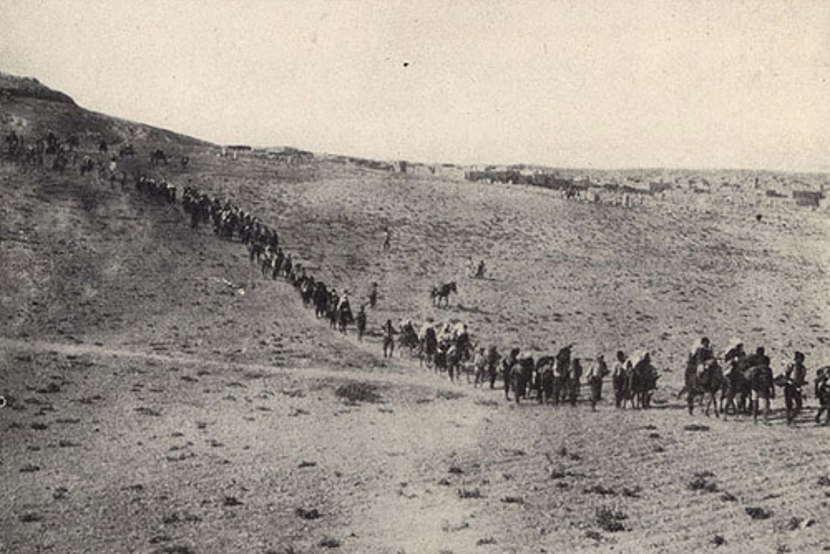Jeanne Merkus - the fatal muse of "Nevesinje gun"
LIKE US ON FACEBOOK – Telegraf English, or write to us: office@telegraf.rs
She attacked the Turks with no fear, next to the bearers who had been a favorite target in battle. The rebels admired her for her courage, but, in the tradition of heroism which is manifested more often than others, were criticized for cowardice.
Her first combat experience was gained during her stay in France, in the middle of the Prussian War (1870-1871) and the terrible German siege of Paris. A bloody struggle that she watched in a hospital uniform becomes a heavy burden with which she carries out humanitarian work. In Garibaldi, Italy she learns about the revolution, and in Jerusalem faces the terror of Ottoman rule over the conquered population. That's when the ideal that leads her to the Balkans is born - the release of Christian nations.
DE PUTA MADRE: This is the most incredible man who has ever set foot in Belgrade!

Other stories that were recorded in Bosnia-Herzegovina's uprising mentioned her skillful mining of bridges, luring a pair of Turkish soldiers in an ambush, and her attempt at blowing up a Turkish fortress. Enemies greeted her with curses and abusive messages, and her boldness on the battlefield inspired the Turks to call her the "Red Devil".
This is an African who has traveled 10,000 kilometers to Serbia. You will be amazed why! (PHOTO)
After the Battle at Ljubinje in 1876, Jeanne was named the bravest fighter, according to some sources, she was awarded the "rank" of the greatest of all heroes, mentioned by King Petar I Karadjordjevic, who participated in the uprising under the pseudonym Petar Mrkonjic.
In addition to her bravery in Bosnia-Herzegovina's uprising (1875-1878), and then in the Serbian-Turkish War (1876-1878), Jeanne excelled in generosity. In addition to rich gifts, the rebels of the European acquaintances tried to acquire the most modern guns, which, although paid, never arrived in Herzegovina. However, in Europe, she managed to bring hundreds of volunteers to fight on the side of the Serbian people.

The former Zemun list "Gradinar" wrote that she invested 2,000 dinars for war aims, more than double the donation from the brothers Krsmanovic, who until Jeanne's arrival were the largest financiers of the uprising. Also, a significant portion of money was given to the Red Cross, and the degree of her caring and selfless nature was proven by her constant awareness of the fate of young soldiers - she left the Military Minister money to divide "among orphan families of Belgrade soldiers that died in the war."
That she was invested in the uprising whole-hardheartedly is evidenced by the story of her love for one of the leaders Mico Ljubibratić. He was an exponent of the Principality of Serbia in the uprising, and she was his right hand. The Austro-Hungarians caught them while crossing from Herzegovina in the Bosnian Krajina and, together with several other insurgents, they were arrested. Jeanne was separated from Ljubibratić, conducted in Linz, where, according to a survey conducted by the Dutch historian Rene Gremo, had some benefits - probably because of her origin.

A friend of freedom in the shadow of charges
After some time, at the end of March 1876, she came to Belgrade, where she was staged a spectacular welcome. Easter procession stopped in front of the hotel "Staro zdanje", in which she resided, and chanted the praises of a young philanthropist, who commissioned her works for the Serbian people.
The news list "Zastava" which reported of the welcome staged for Jeanne Merkus, wrote that a philosophy professor at the Big school called her "a friend of freedom" - whose name Belgrade celebrated with love and respect. However, the most famous verses of the great poet Djura Jaksic, that are recited any time Jeanne Merkus' name is mentioned, or Jenny Merkus, Janja Marcus ... the many names people who widely praised her work referred to her as.

About her stay in Belgrade, writes historian Slobodan Jovanovic.
"... She is a young, rich but not beautiful Dutchwoman ... She became famous as an Amazon woman in the Herzegovina uprising. Belgrade was crazy about this woman... ", his thoughts many year later of the life of the forgotten compatriot.
Those were great days for the future of Serbian pride. Under pressure from the public (which is reflected in the Dragon Battalion Song), the Serbian government together with Montenegro declares war on the Turks on June 30, 1876. The people of Serbia applauded the declaration of war, for which they prepared for months earlier.
Russian-Serbian conference in Belgrade: Day of victory over Hitler’s civilization heritage!
Volunteers were, of course, desirable - all except Jeanne Merkus. When she went to the Drina font, as an honorary adjutant, General Ranko Alimpic did everything to prevent her arrival. However, a plea to the Minister that his army might be spared of such "honors" were not answered. Jeanne, as he wrote to a correspondent of the Viennese list Prese, was at the very top of the command, right next to the third man Volunteer Brigade - Captain Paja Putnik.

The writings that Gremo has disocvered show that the attitude of the top command to the already famous woman in army boots has not changed. General Alimpić, as can be concluded from the diaries of his wife Mileva Alimpić was not resigned to it, at the expense of tradition, that the hero of his brigade be a woman. About her he said that "she does nothing, walks around, carrying a rifle and a revolver, not shooting, but helps to watch." For the same documents, we discover that soon there after was a conflict between the general and Jeanne, when he told her that she must unconditionally leave the front.
As an official reason for her departure from the war is the report from the Serbian diplomatic representative in Constantinople to the Minister of Foreign Affairs. Slobodan Jovanovic writes that a Russian diplomat told Jeanne that the "spy is Čivutin the Austrian". However, for such an accusation there was no evidence, besides Jeanne writing often.
Gremo believes that the trigger of Alimpić's patience was an insult, and it could be said - male vanity. By analyzing the circumstances under which the Dutch woman was expelled from the Drina, it is evident that she did not only have to fight against the enemy army, but also against the invasion of prejudices about "women Riter." Allegations prove that Alimpić and Putnik had difficulties with Jeanne because she sharply criticized the inaction of the state policy towards Bosnia.

"Putnik was, moreover, critical of her spreading communal ideas among fellow soldiers," says Remo in research that spawned a book, "Fatal war muse".
The historian has noted that Jeanne denounced immorality in the army and the general's measures to secure the Serbian side of the Drina, while across the river his soldiers died. What Alimpic could not forgive her was her comment of him being no good of a general and that he should resign.
Since she refused to leave the front, by force and with a military escort, she was transferred to Sabac where she went by boat to Belgrade. If she was a spy, he believes, she would have crossed the Sava to the Austro-Hungarian coast. However, alone and an outcast, groundlessly accused, Jeanne was no longer desirable in Serbia. The young Dutchwoman with "broken wings" returns to her unfinished dream that remained in Jerusalem.

Historian Nenad Urić, Herzegovinian who listened to her participation in the uprising, believes that the fact that Jeanne joined the Serbian branch of the rebels caused her military destiny. With the collapse of Mico Ljubibratić, collapsed her strength, says Urić.
Besides being brave, Zana is described as "a bit spoiled" because, she expected that the Dutch diplomatic service would pull her out if something went wrong.
However, what she did was revolutionary for a woman in that area. In addition to the freedom of oppressed peoples, she fought for a woman's place outside the home and hospitals. She responded to problems with conviction and with her "masculine" behavior (from adulthood she smoked cigars and gracefully rode horses), she intrigued anyone who heard about her, let alone watched her not giving up on the battlefield. Such a woman, considers Urić, is desirable in the uprising.

"The rebels like having people appear from the side, it is propaganda. You are bound to get better support from people from developed countries, rather than conservative circles, and Jeanne, in her fight of the Serbian people in Bosnia and Herzegovina risked her life, but also supported freedom, "says Urić stressing the importance of international support. And this stranger was not only support, but also a true friend of the Christian nation - to which she devoted her whole life.
As a girl she admired Joan of Arc, which explains why she renounced her family and completely turned to revolutionary work. As a volunteer in the Red Cross, she healed and cared for the wounded and sick in France. For the first time she was faced with the horror of war, she saw how hunger and bombing destroyed the country and with her inherited money opened a network of public hospitals for the poor.
When she was expelled from Serbia and returned to the Holy Land, she spent almost all of her possessions. The construction of the temple of salvation stopped, but it was not enough for revenge against the Turkish authorities which, as she wrote to the Ottoman press, remembers "a crazy woman who is fighting against the Ottoman Empire in the Balkans."
The army destroyed all previously constructed, arrested a man which Jeanne ceded the building and dispersed the workers. In such an atmosphere, one of the suppliers saw an ideal opportunity to profit and sue for unpaid debts, even though all the purchases were paid. Jeanne went bankrupt, and the ruins of her temple were seen for many decades to come, until the seventies when a hotel was built.

Jeanne returned to the French Riviera, with no money and property. For some time she lived homeless in Paris, according to some, a doctor found her on the street near the hospital, which was built with her money.
Jeanne, who in the meantime suffered from dementia, was undesired by her relatives, who did not want to hear of her. One of her brothers placed her in a psychiatric hospital for the poor in Utrecht, unwilling to bear the costs of her stay and treatment.
She spent the last two years of her life there - alone and forgotten, and died at the age of 58. For more than 30 years, no one maintained her grave, until the Consul General of the Kingdom of Yugoslavia in Rotterdam, poet and literary critic Sibe Milicic, granted custody for the reconstruction of her tomb and regular maintenance.
In Serbia, not a single trace of Jeanne Merkus remains, and it's been 140 years since her name was celebrated in the streets. Those who today write about "Nevesinje gun" and the war against the Turks, can not leave out the well-known behest benefactress from the Netherlands.
"If I die in battle, my remaining estates goes to the Serbian people. Remember me for my love, "said Jeanne before leaving for the Drina front.
Today, her love for the Serbian people is poorly remembered and Jeanne is rarely mentionned - as a spy or as the great love of the famous leader of the Herzegovina uprising. But, she was a heroine that lent strength to the then oppressed Serbian people, and helped them fight for their freedom. With a pure heart and a full pocket, Dutchwoman Jeanne Merkus, popularly called Jovanka Merkus, Serbian Arc, invested her ideals in the Balkans.
(Telegraf.co.uk/ mojahercegovina.com)
Video: Vučić: Pristojna, vredna i poštena Srbija nikada neće dati sebe
Telegraf.rs zadržava sva prava nad sadržajem. Za preuzimanje sadržaja pogledajte uputstva na stranici Uslovi korišćenja.

